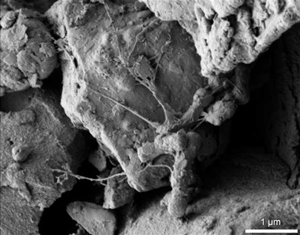Written by Rachel Purser-Lowman for Chemistry World
 With energy demands rising and the increasing importance of low-carbon technologies, scientists in Canada are investigating the microbial conversion of coal into methane, to find a way that coal, especially low grade unmineable coal, can be used, whilst minimising its environmental impact.
With energy demands rising and the increasing importance of low-carbon technologies, scientists in Canada are investigating the microbial conversion of coal into methane, to find a way that coal, especially low grade unmineable coal, can be used, whilst minimising its environmental impact.
Methane, the primary constituent of natural gas, releases significantly less carbon dioxide, when burned, than coal. Biological generation of methane in a coal seam results from microbial activity that starts during the early stages of coal formation.
Increased pressure and heat eventually destroys the microbes, but secondary methane production can occur when meteoric water infiltrates the cooled coal, bringing new microbes and nutrients.
Interested? If so, read the full article at Chemistry World here!










